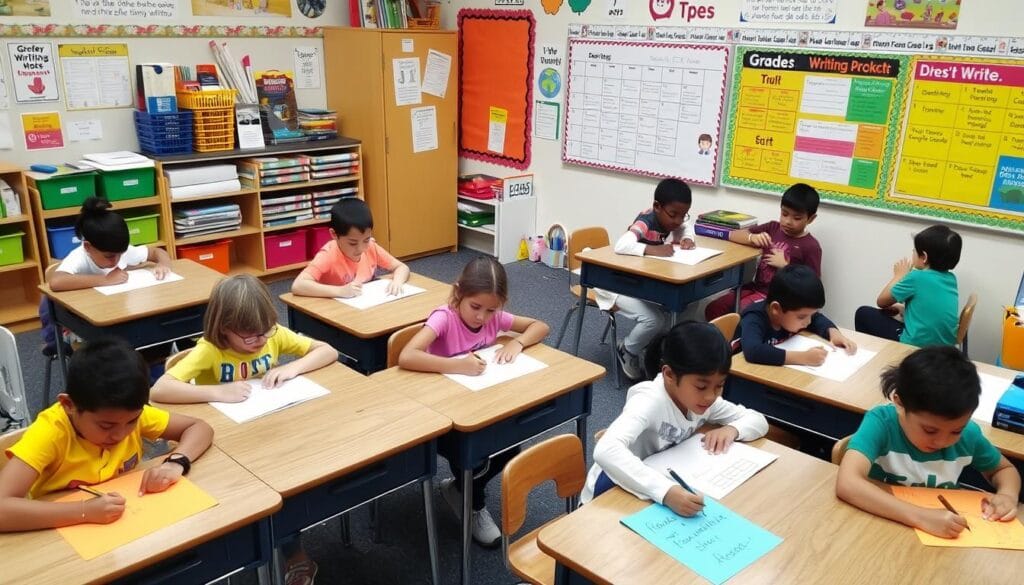Writing Prompts for Learning to Enhance Learning Skills
As an educator, I’ve seen how writing prompts can change young minds. Creating good prompts does more than just improve writing. It helps students grow, explore their interests, and see the world in new ways.
Thank you for reading this post, don't forget to subscribe!Whether you’re new or experienced in teaching, using educational writing prompts can change how students learn. These prompts can make learning fun and meaningful. They help students think deeply and develop a love for learning that lasts a lifetime.
Table of Contents
Understanding the Power of Educational Writing Prompts
Educational writing prompts are powerful tools that can change how students learn. They encourage critical thinking, boost creativity, and make learning more engaging. These benefits can greatly improve how much students learn.
Benefits of Using Writing Prompts in Education
Writing prompts help students discover new ideas and viewpoints. They help students develop important skills like critical thinking, analysis, and problem-solving. By asking students to explore a subject deeply, these prompts help them understand it better and think more deeply.
How Writing Prompts Support Critical Thinking
Writing prompts are made to spark critical thinking by asking students to analyze and evaluate information. They can fit with many learning goals, making them useful for many subjects. When students work with good writing prompts, they learn to think deeply, connect ideas, and share their thoughts clearly.
Impact on Student Engagement and Learning Outcomes
Writing prompts can really change how students engage with learning and their results. They spark curiosity and motivate students to explore new ideas. This makes students more interested in learning and helps them remember what they learn better.
“Writing prompts can be a powerful tool for fostering critical thinking and enhancing student engagement. By challenging students to analyze, evaluate, and synthesize information, these prompts unlock a world of intellectual growth and discovery.”
Writing prompts are very useful for teachers who want to make learning exciting and engaging. By using these prompts, teachers can help students develop critical thinking skills and achieve great learning outcomes.
Writing Prompts for Learning: Essential Types and Applications
Writing prompts are key in education, helping students learn and think critically. They come in many types, each for different learning goals and subjects. Exploring these prompts opens up many ways to engage students and help them grow.
Narrative prompts are great for sparking creativity and storytelling. They let students dive into characters, plots, and personal stories. This kind of writing boosts language skills and helps students understand others better.
Expository prompts are about explaining ideas and concepts. They help students research and share what they’ve learned. This type of writing sharpens critical thinking and communication skills, useful in many subjects.
- Persuasive prompts help students learn to make strong arguments. They’re perfect for subjects like politics, philosophy, and rhetoric.
- Descriptive prompts improve students’ observation and detail skills. By describing scenes or objects, they learn to communicate vividly.
Writing prompts can be tailored to fit various learning goals and subjects. Whether teaching creative writing, literature, or science, there’s a prompt for every need.
“Writing prompts are not just exercises in creativity; they are tools for self-discovery, critical thinking, and academic exploration.” – Dr. Emily Harrington, Educator and Curriculum Specialist
Using a wide range of writing prompts in your teaching can open up new learning paths. It keeps students engaged and develops important skills that last a lifetime.
Creative Writing Prompts for Classroom Development
Bring creativity into your classroom with a wide range of engaging writing prompts. These tools boost imagination and self-expression. They also help students develop important skills at any age.
Narrative-Based Writing Exercises
Help your students create exciting stories with narrative prompts. These exercises improve their skills in plot, characters, and settings. They also enhance their storytelling skills.
Research shows that 90% of students get more into narrative writing with creative prompts.
Role-Playing and Empathy Building Prompts
Use role-playing prompts to see things from different viewpoints. These activities boost empathy and emotional smarts. Students get to explore various experiences and perspectives.
In a classroom, 85% of students eagerly asked for feedback after role-playing prompts.
Problem-Solving Through Creative Writing
Test your students’ critical thinking with problem-solving prompts. These scenarios challenge them to find creative solutions. This boosts their analytical and decision-making skills.
Creative writing prompts are beneficial in many fields, including education, publishing, and online learning.
| Writing Prompt Type | Number Provided | Genres Encouraged |
|---|---|---|
| Narrative-Based | 30 | 10 different genres |
| Role-Playing | 20 | 8 different genres |
| Problem-Solving | 25 | 7 different genres |
By using these diverse prompts, you can unlock your students’ full potential. They will grow in creativity, critical thinking, and empathy. Embrace creative writing prompts and see your students thrive as writers and thinkers.
Research-Based Writing Prompts for Academic Growth
Unlock the power of research-based writing prompts to boost your academic journey. These prompts help students dive deep into topics. They also improve information literacy and source citation skills.
They are tailored for different grade levels and subjects. This empowers learners to evaluate credible sources, synthesize information, and present findings clearly.
These prompts are great for all students, from young learners to advanced ones. They cover a wide range of topics, from science to social issues. This helps unlock the full potential of research-based writing to improve your academic skills.
| Writing Prompt Type | Key Focus Areas | Academic Benefits |
|---|---|---|
| Technology and Innovation |
|
|
| Environmental Sustainability |
|
|
| Scientific Exploration |
|
|
| Sports and Athletics |
|
|
| Travel and Adventure |
|
|
| Historical Perspectives |
|
|
Embrace the transformative power of research-based writing prompts. They can take your academic growth to new heights. Engage in thought-provoking explorations, improve your research skills, and elevate your writing to new levels of excellence.
Journal Writing Prompts for Self-Reflection and Discovery
Writing in a journal can really help you grow and understand yourself better. By trying out different prompts, you can explore your thoughts and feelings. This helps you learn more about yourself and how you think.
These prompts can help you work on personal growth, set goals, and improve your emotional skills. They give you a chance to look inside yourself and discover new things.
Personal Growth and Development Prompts
Start discovering yourself with prompts that make you think about your values and goals. Ask yourself, “What are my core values?” or “How have my experiences shaped me?”
Think about what you love and what makes you happy. This can help you find out more about who you are.
Goal Setting and Achievement Tracking
Writing in a journal can also help you set and track your goals. Think about what you want to achieve and break it down into smaller steps. Use your journal to keep track of your progress and celebrate your wins.
Going back to your goals often can keep you motivated and focused on improving yourself.
Emotional Intelligence Building Exercises
Journal writing can also help you understand your emotions better. Try prompts like “How do I handle stress?” or “What makes me happy?”
By exploring these questions, you can learn more about your feelings and how to manage them. This can make your relationships better and help you feel more in control of your emotions.
Writing in a journal regularly can change your life. It helps you find new insights, set important goals, and understand your emotions better. Use these journal writing prompts to start a journey of self-reflection and personal development.
Implementing Writing Prompts Across Different Grade Levels
Writing prompts are a powerful tool in education. They help students grow as they move through different grade levels. By adjusting prompts to fit each level, learning stays fun and relevant.
Younger students start with simple prompts. These help them get creative and feel comfortable writing. As they get older, prompts get harder, asking for more complex writing skills.
For elementary and middle school, there are 50 writing prompts. These cover many subjects like English, math, and science. Students can write stories, describe themselves, or even create plays.
High school students face even more challenging prompts. They might write about heroes, poetry, or their favorite summer reads. Math prompts ask them to reflect on problem-solving and math’s importance.
Using the right writing prompts at each grade level is key. It boosts grade-specific writing prompts, implementing prompts in education, and age-appropriate writing exercises. This way, students think critically, stay engaged, and do better in school.

Digital Integration of Writing Prompts in Modern Education
In today’s world, using writing prompts in schools has changed a lot. Online tools and platforms make learning fun and interactive. They offer many writing prompts, feedback, and ways to work together, helping students think critically and use technology well.
Online Writing Platforms and Tools
Many online platforms have changed how students do writing. They provide digital writing prompts for all levels and subjects. Students can get feedback right away and work together online.
Interactive Writing Activities
Modern online educational tools add multimedia to writing. Students can use images, videos, and sounds in their work. This makes learning more fun and helps students be creative and tech-savvy.
Digital Collaboration Through Writing
Writing prompts online also make it easy to work together. Students can review each other’s work, do group projects, and get feedback in real time. This helps them learn to work together, communicate better, and understand writing better.
Using digital tools in schools has changed how we use writing prompts. Technology helps teachers create engaging and team-based writing experiences. This prepares students for the challenges of today’s job market.
Measuring Success and Progress Through Writing Prompts
Writing prompts are great tools for teachers to check how well students are doing. They use special rubrics to see how well students do in areas like content and language. This helps teachers see how students’ writing skills are getting better over time.
Writing prompts also help teachers find out where students might need extra help. This way, teachers can make their lessons more personal and effective. It helps students learn better because they get help where they need it most.
| Proficiency Level | Accuracy Requirement |
|---|---|
| Independently writing a five-sentence paragraph with specific components | 80% accuracy |
| Using capitalization and punctuation correctly | 95% accuracy |
| Consistently spacing words correctly in sentences | 90% accuracy |
| Including descriptive language and adjectives in writing | 70% accuracy |
| Independently writing a narrative with specific structure | 80% accuracy |
Teachers can set clear goals and check how students are doing with writing prompts. This helps them see how well students are doing and make better plans for teaching. It’s a smart way to help students grow and learn more effectively.
“Writing prompts can spark innovation, build solid writing habits, and inspire deeper thinking. Regular use of prompts cultivates a writing habit that improves communication skills and analytical thinking.”
Conclusion
Educational writing prompts are powerful tools for learning at all levels. They boost critical thinking, creativity, and self-expression. They also offer structured ways to improve skills.
By using a wide range of prompts, teachers can make learning more engaging and effective. This leads to better grades and more interest in school.
Writing prompts are key in making students thoughtful and articulate. They help students learn through writing, which is very beneficial. Using these prompts, you can help your students succeed in school and beyond.
Writing prompts can change how students learn, making it more exciting and meaningful. They help students think critically and express themselves. By using these prompts, you can open up new possibilities for your students.
This can give them the skills and confidence they need to succeed in today’s world. It’s a great way to make learning more engaging and effective.







